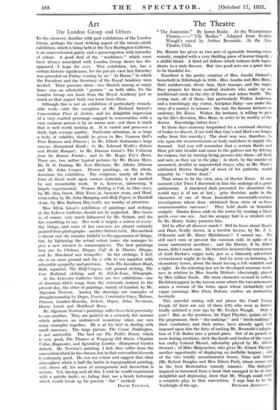The Theatre
" The Anatomist." By James Bridie. At the Westminster Theatre.—" Vile Bodies." Adapted from Evelyn Waugh's novel by Arthur Boscastle. At the Arts Theatre Club.
Da. BRIDIE has given us two acts of agreeable drawing-room comedy, coupled with a very thrilling piece of horror tragedy : a skilful blend. A third net follows which reduces both ingre- dients to a stale flavour. But two good acts are a great deal to be thankful for.
Excellent is the pretty creation of Miss Amelia Dishart's household in Edinburgh in 1828--Miss Amelia and Miss Mary, their maidservant, Jessie Ann, their teacups, and the negus they prepare for those medical students who make up an intellectual circle in the city of Hume and Adam Smith. The young men, all of them—but particularly Walter Anderson and a tremblingly shy visitor, Adolphus Raby—are under the sway of a martyr to science : the real, the fainous lecturer in anatomy, Dr. Knox. Walter, for instance, is willing to give up his life's devotion, Miss Mary, in order to be worthy of the doctor. Knowledge before love !
In those days anatomy languished for a continual shortage of bodies to dissect. (I am told that Guy's and Bart's no longer suffer from this scarcity.) The short way was, therefore, to rely upon the resurrectionists or body-snatchers to supply the demand. And you will remember that a certain Burke and Hare got into trouble and came to the gallows not by delving for corpses, but by turning living persons into them—all fresh and new, as they say in the play : in short, by the murder of unwanted, derelict or unprotected strays, who, as Mr. Shaw's celebrated Doctor thought of most of his patients, would arguably be better dead."
That seems to be the view, also, of Doctor Knox. At one moment (Act Two) I discerned in him the makings of a great antinomian. A murdered drab presented for dissection (he would say) is of use at last ; grim doctrine, quite in the character of one of those formidable nineteenth-century investigators whose dour, whiskered faces stare at us from commemorative canvases ! They hold skulls or brandish scalpels. Doctor Knox adds to the terror by wearing a black patch over one eye. And his scrappy hair is a virulent red. So Mr. Henry Ainley -presents him.
Did he after all discover much ? Did he know about Burke and Hare, lividly shown, in a terrible tavern, by Mr. J. A. O'Rourke and Mr. Harry Hutchinson ? I cannot say. We still can't cure or prevent the common cold, in spite of so many anatomical sacrifices ; and the Doctor, if he didn't know, didn't much care. He therefore incurred the resentment of Auld Reekie's vulgar mob, just as a blatantly advertised vivisectionist might do to-day. And he went on lecturing, in elementary terms, about the heart having a left ventricle and a right. In the relenting last act he developed amorous weak- ness in relation to Miss Amelia Dishart—charmingly played by Miss Gillian Scaife. His stern character seemed to soften. He did not appear in the tavern scene where the two miscreants annex a woman of the town, upon whose melancholy and vague croonings Miss Flora Robson confers an enchanting lassitude.
This merciful ending will not please the Cruel Young People (if there are any of them left) who were so fantas- tically satirized a year ago by Mr. Evelyn Waugh. Only a year ! But, as the producer, Sir Nigel Playfair, points out in the programme, their " shy-makings " and " blush-makings," their vocabulary and their antics, have already aged, and imposed upon him the duty of making Mr. Boscastle's adapta- tion of Vile Bodies into a period piece. Out of its period, as more lasting creations, stick the heads and bodies of the vague but crafty Colonel Blount, admirably played by Mr. Athole Stewart ; of Miles Malpractice, who gives Mr. Ernest Thesiger another opportunity of displaying an ineffable languor ; and of the two totally unsentimental lovers, Nina and Adam (Mr. Robert Douglas and Miss Eileen Peel), whose scenes are in the best Restoration comedy manner. The dialogue, inspired or borrowed from a book that managed to be at once delightful and depressing, show that Mr. Waugh could write a complete play in that convention. I urge him to be the






































 Previous page
Previous page